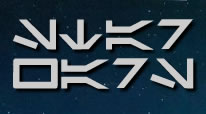 |
 |
 |
||||||||
 |
||||||||||
|
Rules to play SWmud – |
Sabacc
This is the game that is played throughout the Star Wars Galaxy. It's the game that Han and Lando played where Han won the Millennium Falcon.
Try a downloadable version of sabacc (virus-free) that you can play on your own computer. (I don't take credit for it, I'm just passing it on.)
The Cards
Sabacc is played with a deck of 76 cards made up of four suits–Sabres, Staves, Flasks, and Coins–and a set of face cards. Each suit is made up 11 regular cards (numbered 1-11) and four ranked cards: the Commander, the Mistress, the Master, and the Ace (numbered 12-15). The set of face cards consists of 16 cards, each with a *negative* value. (Note that it is possible to have a hand with a net negative value.) In addition, each face card has a special name and symbol. There are two instances of each face card in the deck.
Using Tarot Cards
If you are using Tarot cards to play sabacc, you'll need to use *two* decks and remove some of the cards. Two things that are a little tricky to remember are that the "special" face cards are *negative* in value, and that the "royal" cards in a suit are numbered 11-15. The following table summarizes the conversion, if you are using the common Knight-Ridder tarot deck:
| SABACC | TAROT |
| Sabres Staves Flasks Coins |
Swords Wands Cups Pentacles |
| 1-10 11 Commander (12) Mistress (13) Master (14) Ace (15) |
I-X Page [a confusing conversion] Knight Queen King Ace |
| Idiot (0) Queen of Air and Darkness (-2) Endurance (-8) Balance (-11) Demise (-13) Moderation (-14) The Evil One (-15) The Star (-17) |
Fool (0) The High Priestes (II) Strength (VIII) Justice (XI) Death (XIII) Temperance (XIV) The Devil (XV) The Star (XVII) |
In the Star Wars galaxy, electronic pulses randomly shift the faces of the cards until they're locked in place when the player holds them in a "neutral field." The following rules include several mechanics which simulate the effect of the random pulses.
Rules of Play
The object of sabacc is to have the highest card total which is less than or equal to 23. A total which is over 23, under negative 23, or exactly 0 is called a "bomb out," and requires the holder of the hand to pay a penalty, as described below.
There are two pots to be won in the game of sabacc. A pot is the total amount of credits staked by all of the players in one hand of the card game (just like poker). Each pot should be kept clearly separate from the other. The first of the two pots is called the "hand pot" and is taken by the winner of the current hand. The second is the "sabacc pot" and continually builds over several hands until it is won with a special hand, as described below.
To start a game of sabacc, choose one player to be the dealer of the first hand. Other players wishing to be dealt into a hand must first ante by placing one credit into the *hand* pot. Each player must also ante one credit into the sabacc pot it is empty, including the first hand of the game.
Each player takes a turn in order, beginning with the player to the dealer's left, that includes the phases listed below. Once a player has completed all the phases, his or her turn is over and play proceeds to the left. After each hand, the "dealership" rotates to the left.
Phases of a Hand
Betting Phase
Each player is dealt two cards. The player to the left of the dealer begins play with the option to bet. If he/she chooses to do so, that bet is placed in the hand pot. If a bet is placed, each player must match that bet if he or she wishes to remain in the hand.
Only the player whose turn it is may place a bet, but that bet may be raised by any of the players in turn. The betting and raising limits are three credits. Before moving on to the next phase, the player whose turn it is must ask each player if they wish to fold. A player may only fold during the the betting phase, and must pay one credit to the sabacc pot to do so.
Shifting Phase
After the betting phase is completed, the player whose turn it is rolls a six-sided die. If the result is 1, 2, or 3, *shifting* occurs. [Ed. Note: i.e., odds are 50-50 that your card will shift during any given turn.]
During a shift, each player must discard one card from his or hand, chosen randomly by the player to the right. All of the players' discarded cards are then gathered by the dealer, reshuffled, and then dealt to the players in order. Note that if a player folds on his or her *own* turn, the player must still roll to see if a shift occurs, but his or her cards are not used during the subsequent shuffling and re-dealing.
Calling Phase
After the shifting phase is completed, the player whose turn it is asks if anyone would like to call the hand. When a hand is called, each player must immediately place their cards face-up on the table and declare what they have. [Ed. Note: in the Star Wars galaxy, the table emits a low-frequency "suspension field" that locks the values of the cards in place.] See "Winning a hand" below for victory conditions and penalties.
A player may only call during the calling phase of another player's turn; i.e., he or she may *not* do so during his or her own turn. No one may call the hand during the calling phase until every player, including the dealer, has had at least one turn.
If a hand is called, play proceeds to the drawing phase. If no one chooses to call a hand, play goes back to the betting phase for another round.
NOTE: You may wish to increase the minimum number of turns required before a hand may be called when playing with less than four players; this allows for more interesting (and richer!) hands to develop.
Drawing Phase
After the calling phase, the player whose turn it is has the option to draw one card from the deck. If the player holds more than two cards, he or she has the option to exchange one of the cards in his or her hand for a card drawn from the deck *or* simply draw a card from the deck and had it to his or hand, but not both. Note that discarded cards are removed from play and not put back in the deck.
There is no limit to the number of cards that a player may hold in his or her hand, but a player may not have *less* than two cards at any time.
Winning a Hand
When a hand is called, the player with the highest card value which is less than or equal to 23 wins the hand. A player may also win a hand if every other player folds. Note that the winning player wins the hand pot only, not the sabacc pot.
If any player has a total which is greater than 23, less than negative 23, or exactly 0 when the hand is called, he or she has "bombed out." When a player bombs out, he or she must match the number of credits currently in the hand pot and pay it to the sabacc pot.
In addition, if the player who called the hand does not win it, he or she must pay the sabacc pot just as if he or she had bombed out.
If two or more players are tied, they must participate in a "sudden demise." In a sudden demise, the dealer deals each tied player an additional card from the deck which is then added to their original hands. The best modified hand, which is still equal to or less than 23, takes the pot. If there is still a tie after the additional deal, the players split the pot.
Special Hands and the Sabacc Pot
To win the sabacc pot, a player must have one of two special hands. The first occurs when has a card total of exactly 23. This hand is called "Pure Sabacc," and is usually accompanied by an enthusiastic cry of "Sabacc!" when the cards are turned over.
The other special hand is called an "Idiot's Array" or "Literal Sabacc." To achieve this hand, a player must have the Idiot face card (value 0), a two of any suit, and a three of any suit; i.e., a 0-2-3.
An Idiot's Array beats a Pure Sabacc, but if two or more players have the same special hand, a sudden demise is held for both the hand and sabacc pots.
Note that a special hand, like any other, can only be declared when a hand is called.
- This file courtesy of:
- – M. Brent Sleeper – bsleeper@carleton.edu
- Flightpath Communications – Flightpath@aol.com
Miscellaneous || Universe
 |